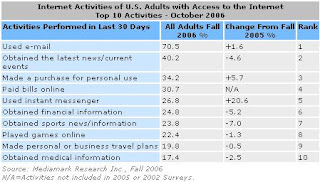Worldwide spam volumes increased from 31 billion messages a day in October of 2005, to 61 billion messages per day in October 2006 — an increase of nearly 100%. IronPort
predicts that, this December, the number of spam messages will average 78 billion a day — up from 38 billion last year. :-(
A new technique known as image spam, reached a new high of 25% of total spam volume in October of 2006, compared to 4.8% in October 2005 — an increase of 421%. :-( :-( :-(
IronPort offers ten "do's and don'ts" to avoid the dangers associated with spam and other online dangers:
1) Don't Open
Whenever possible, do not open spam messages. Frequently spam messages include software that enables the spammer to determine how many, or which, email addresses have received and opened the message. A suspicious email is almost always spam.
2) Don't Respond
The best way to deal with email messages from unknown or suspicious addresses is to delete them, or allow your spam filter to quarantine them. If you respond to a spam message, even asking to be removed from their list, you will have confirmed to the sender that they have indeed reached a valid email address and your inbox may become the target of even more spam. If you are unsure whether a request for personal information from a company is legitimate, contact the company directly or type the website URL directly into your browser.
3) Don't Click
If you click on a link (even an "unsubscribe" link) offered in a spam message, you may infect your computer with spyware or a virus. Instead, delete the email immediately. If a message that appears to be from your bank, credit card company, eBay, Paypal, or others requests that you to click through to validate account details—don't. They already have your account details, so validation or confirmation should not be necessary. Simply delete the message. If you have questions about an email from a familiar organization, contact them by phone.
4) Don't BuySpam exists because it's profitable. It costs almost nothing for a spammer to send a million messages. If even one in that million people buy something, they're making money. Take the profit out of spam. Never purchase anything from spammers. Tell your friends and family to do the same—no matter how good the offer looks.
5) Don't Use Your Primary Email
AddressUsing your primary email address anywhere on the Web puts it at greater risk of being picked up by spammers. Use a secondary or temporary account for online transactions.
6) Don't Believe Everything You Read
Forwarded warning emails and chain letters are more prevalent during the holiday season. Spammers will harvest good email addresses from these forwarded messages. After a few generations, many of these letters contain hundreds of good email addresses. Consequently, people who were worried about the "missing girl" or the "desperate refugee" find themselves not only passing on a hoax, but also the recipients of more spam.
7) Do Use a Temporary or One-Time Use Credit Card
When in doubt; use a temporary or a one-time use credit card. Most major banks can provide these types of cards to help avoid abuse.
8) Do Check Security Policies
Use caution when posting in newsgroups, filling out unsecured forms on the Web, or posting your email address on websites. Verify the security policy of the website to ensure that your email address will not be shared with other companies.
9) Do Make Sure Your ISP or Company Has Spam, Virus and Spyware Protection
Spam emails are very often connected with viruses, so it's critical to have both anti-spam and anti-virus protection. Spam messages often include links to websites with spyware or malware. Check with your ISP or IT department to make sure you have adequate security against these kinds of threats. Having spam, virus and Web-based malware protection at the gateway can make a significant difference.
10) Do Use Your Common Sense
If it looks like spam, it probably is. Delete it.
Happy "Spam-Free" Holidays :-)



